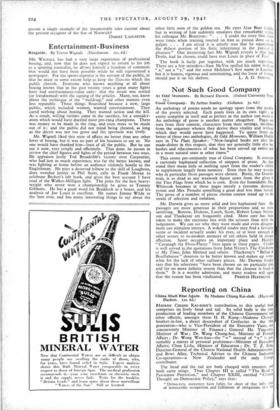Entertainment-Business
Ringside. By Trevor Wignall. (Hutchinson. nos. 6d.)
MR. WIGNALL has had a very large experience of professional boxing, and, now that he does not expect to return to his job as a sporting journalist, he allows himself a freedom of comment that would not have been possible while he still represented a newspaper. For the sports-reporter is the servant of the public, in that he must to some extent help to keep the illusions which the public cherish. Everyone who knows anything at all about boxing knows that in the past twenty years a great many fights have had entertainment-value only : that the result was settled (or foredoomed) with the signing of the articles. Many, too, knew about the technique of the " build-up," and other matters even less reputable. These things flourished because- a new, large public, which included women, wanted entertainment. They
cared nothing about boxing. They wanted action and the kill. As a result, willing victims came to the sacrifice, for a consider- ation which would have dazzled most pre-1914 champions. There was money to be made in the ring, and even more to be made out of it : and the public did not mind being cheated, as long as the deceit was not too gross and the spectacle was lively.
Mr. Wignall liked this state of affairs no better than any other lover of boxing, but it was no part of his business to say so. No one would have thanked him—least of all the public. But he can say it now, very crisply and efficiently. That done, he passes in review the chief figures and fights of the period between two wars. He appraises justly Ted Broadribb's victory over Carpentier, who had just as much experience, was far the bet-Eel known, and was fighting at home before an audience violently hostile to the Englishman. He pays a deserved tribute to the skill of Loughran, does overdue justice to Phil Scott, calls in Frank Moran to celebrate Beckett's left hook, and gives the best account I have read of the Walker-Milligan fight. The prize for the best heavy- weight who never won a championship he gives to Tommy Gibbons. He has a good word for Braddock as a boxer, and his analysis of Joe Louis is excellent. He names Jimmy Wilde as the best ever, and has many interesting things to say about the other little men of the golden era. He rates Max Baer highly, but in writing of him suddenly emulates that remarkable stylist, his colleague Mr. -Bennison : " . . . I credit the story that ihere were times when training reacted on him as poison does on its gulper. . . . I am afraid it is utterly true that he squandered the richest portion of his fistic inheritance in the pursuit of pleasure." One interesting fact Mr. Wignall reveals is that Jack Doyle, had he chosen, could have met Louis in place of Farr.
The book is lazily put together, with too much repetition. There are a few mistakes—Sam McVea spelled his name. with an "a," not a "y," and the tenor Melchior's first name is Lauritz: but it is honest, vigorous and entertaining, and the lover of boxing


































 Previous page
Previous page